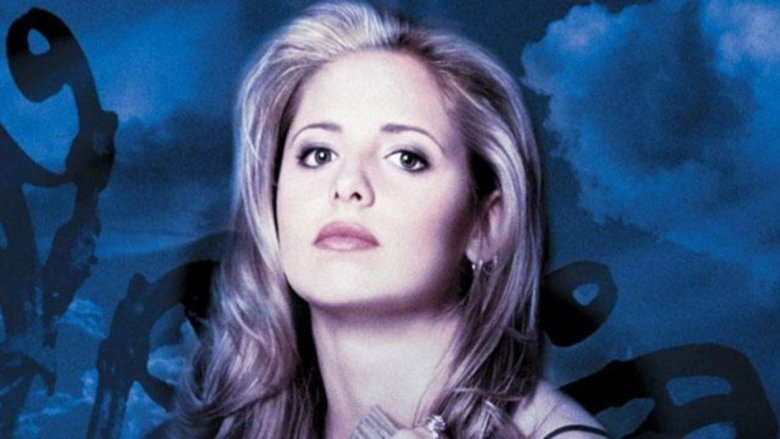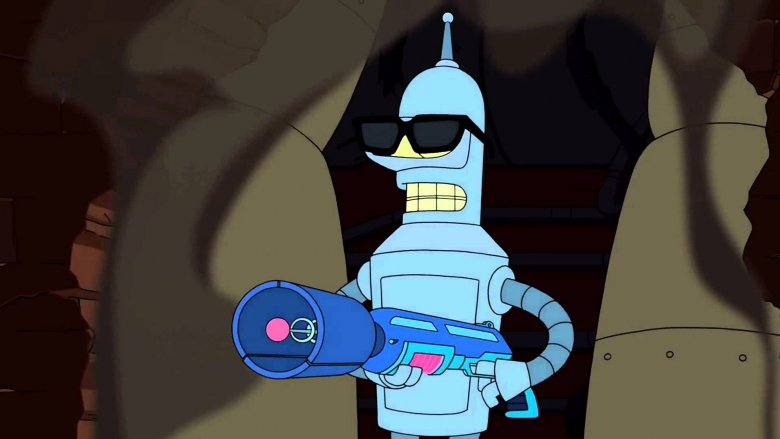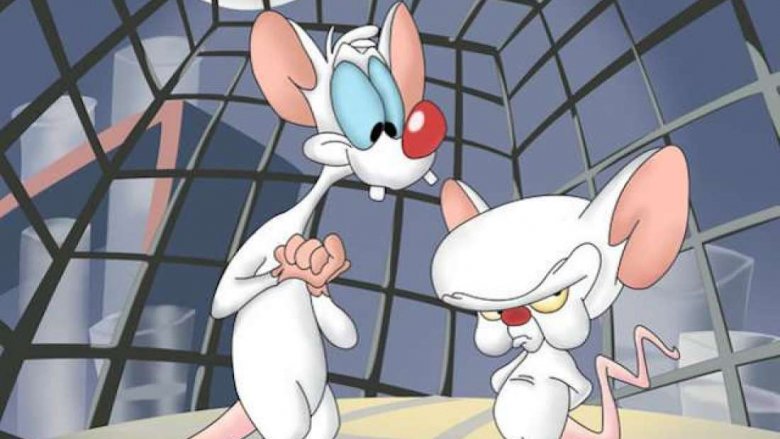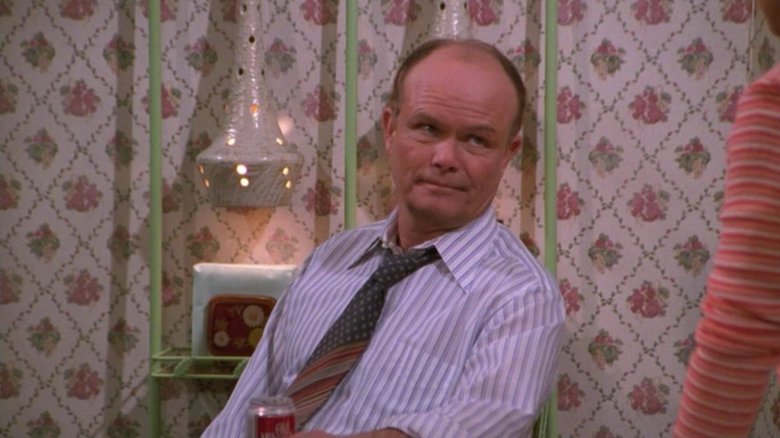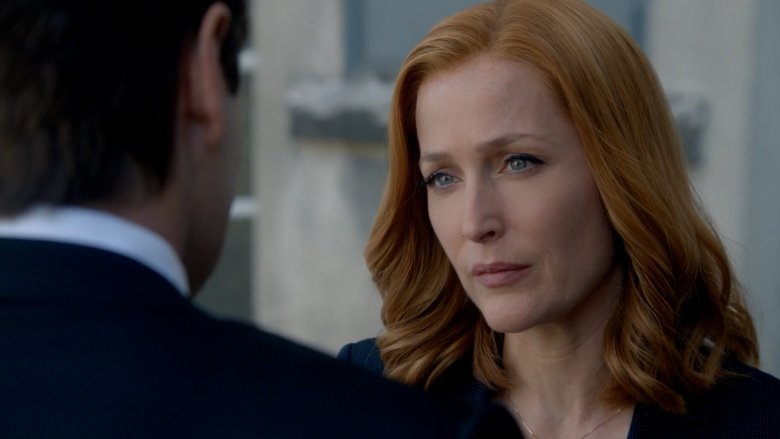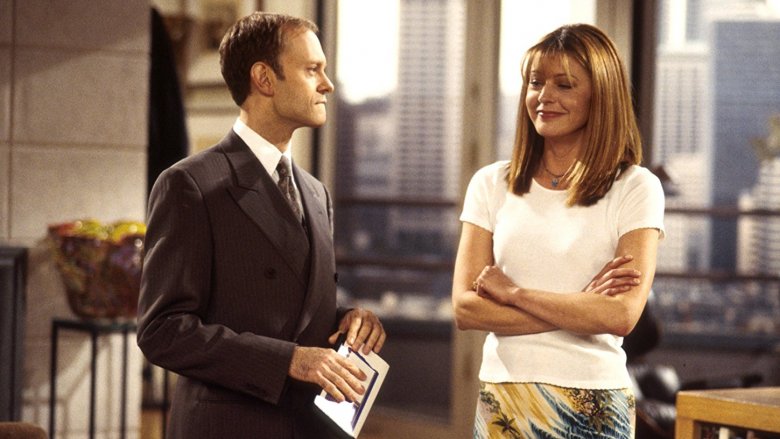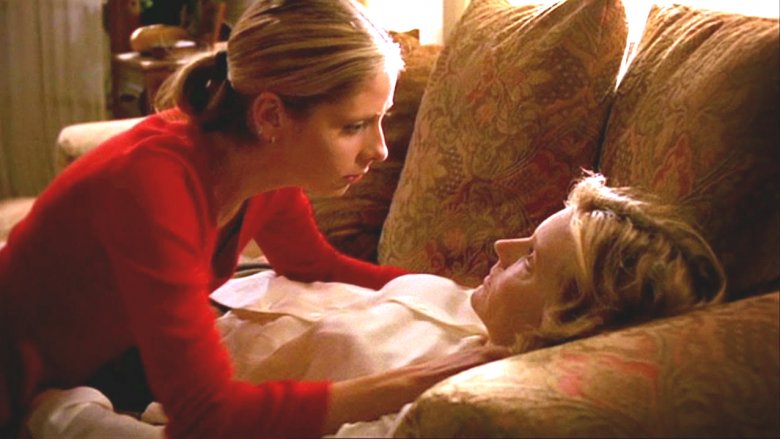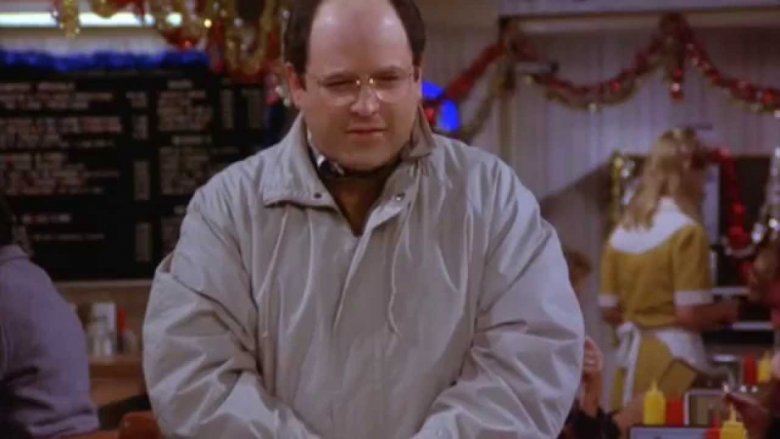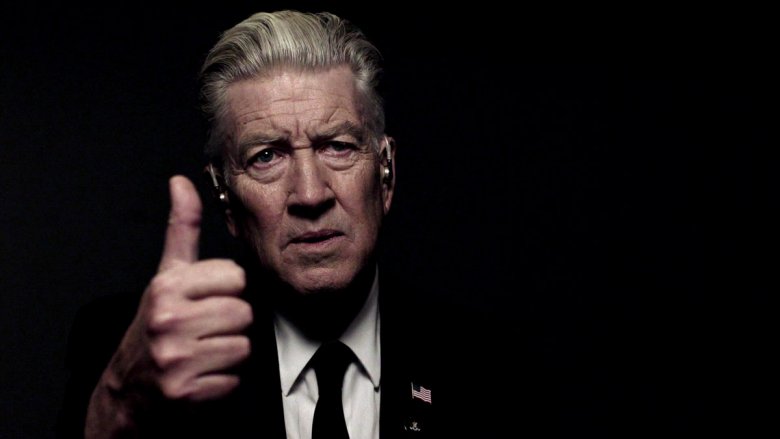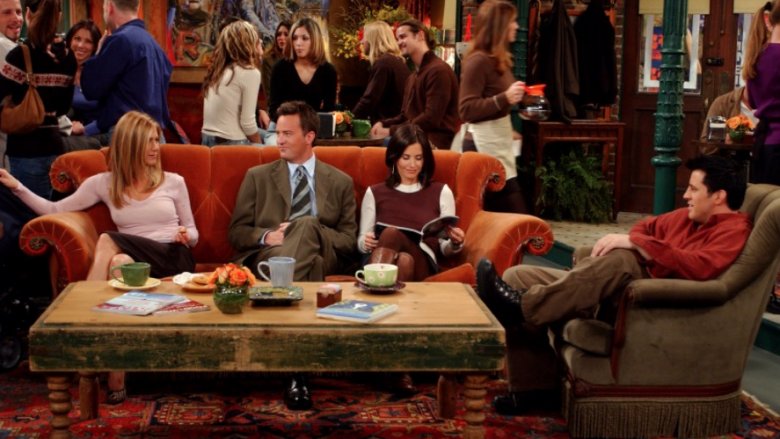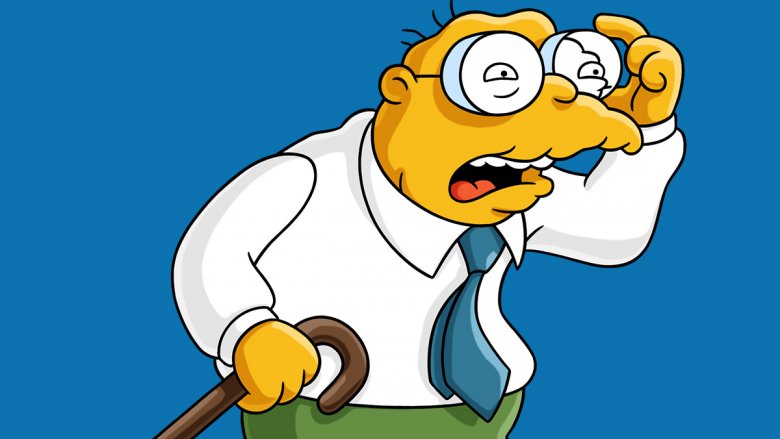Fan Theories That Completely Change These '90s Shows
Fan theories can sometimes be the best part of loving a story. The thrill of feeling like you're a participant in the creator's world while picking and connecting seemingly disparate moments to create new additions is thrilling—and it's even more exciting to look back on works you haven't seen in years and notice new details that completely change the way you first saw them. With that in mind, here are our favorite fan theories about '90s television shows.
Futurama
While there's plenty of period piece television that wryly comments on the modern day (you can scroll down for a particularly groovy example), Futurama twisted the formula by catapulting a mild-mannered pizza delivery guy a thousand years into the future of 2999 (which was surprisingly similar to our 1999 lifestyle). The show followed delivery boy Fry, alien pilot Leela, and lovably larcenous robot Bender as they delivered packages and were occasionally mistaken for gods in a series that was equal parts Star Trek and The Simpsons—the latter of which makes particular sense, since both it and Futurama were created by Matt Groening.
Bender, in particular, quickly became a fan favorite as he stole his way through the show (and through viewers' hearts). But one Redditor pointed out that the robot's behavior in the pilot is a far cry from his amoral actions later in the series. In fact, his first action on the show is to try to end his own life out of guilt for the part his (robotic) hand played in helping construct booths used for that very purpose. The savvy fan points out that when Bender is electrocuted, he "reboots" and imprints on whatever he's around at the time, a later example leading to a "penguin mode" Bender. In the pilot, he gets shocked and wakes up in a museum exhibit full of famous criminals, rebooting him into the robotic robber we know and love.
If you or someone you know is struggling or in crisis, help is available. Call or text 988 or chat 988lifeline.org
Pinky and the Brain
Pinky and the Brain has one of the catchiest theme songs of any '90s cartoon, and one that quickly sets up the core concept of the show: "Pinky and the Brain / One is a genius, the other's insane." But as numerous viewers have pointed out, the two characters aren't explicitly named in the theme song. We assume Brain is the genius and Pinky is insane because the former is always inventing gadgets (and is voiced by deep-voiced Maurice LaMarche, doing his best Orson Welles impression) while the latter acts randomly, but that's never explicitly confirmed in the show.
One YouTuber runs through a whole gamut of evidence that posits that Pinky is actually the genius, while Brain, with his constant obsession with world domination, is the insane mouse. The evidence is compelling—Pinky's shown in numerous episodes to be able to read and write better than Brain, occasionally points out Brain's mistakes in his myriad of inventions, and Pinky even manages to take over the world himself a couple of times (at least until Brain manages to mess it all up and reset the status quo). In fact, the theory makes the show a bit more nuanced, since the show's base concept of two wacky mice trying and failing to take over the world actually becomes about an insane mouse's inability to accept his own intellectual failings, choosing instead to blame his closest friend.
That '70s Show
That '70s Show (that show about the '70s that was made in the '90s) was a sitcom smash, catapulting a handful of young actors into household name status. It featured Mila Kunis, Topher Grace, Ashton Kutcher, and a bunch more, along with memorable cameos from comedians like Cheech Marin and Mitch Hedberg, but it was Kurtwood Smith's perennially grumpy character, Red, that held the show together. His old school work ethic let the show wink at the changing values between generations, a message that had a particular resonance for the Gen Xers watching.
How exactly Red became such a stick in the mud was left a mystery for fans to solve. One Redditor posited the theory that Red is actually Richie from Happy Days, 20 years after going off to the Korean War. The theory goes that by the end of Happy Days, Fonzie and Richie are parted by the war, and without Fonzie to keep Richie cool and relaxed (along with the stresses of war), Richie comes back as Red, a complete square with no patience for shenanigans. The timeline even matches up, since Happy Days takes place twenty-odd years before That '70s Show. Plus, it would be satisfying to connect the two shows, since both are about looking back at a bygone era as a commentary on the modern day. As to what happened to The Fonz himself in this theory, we like to think of him riding the American freeways, fixing jukeboxes and dispensing life advice well into his old age.
The X-Files
Ostensibly a show about things that go bump in the night and the sexy FBI agents who hunt them, The X-Files was really about Gillian Anderson's scowling Scully no-selling whatever supernatural nonsense was happening right in front of her nose. David Duchovny's Mulder might have wanted to believe (along with the viewers), but Scully was the hard-nosed skeptic who endeared viewers to the world of the show.
Still, despite Scully's almost willful disbelief in any sort of digital ghost or desert beehives, that hasn't stopped fans from wanting to connect her more concretely to the more outlandish aspects of the show. One theory in particular argues that Scully is actually immortal—a surprisingly coherent argument based on a gamut of different episodes, the most convincing bit of evidence coming in the season 6 episode "Tithonus." In the episode, a supposedly immortal man tells Scully that the secret to his immortality is by "looking away from Death," and tells her to do the same after they're both shot. (Scully lives, of course.) While the theory seems like it might put a crack in Scully's endearing skepticism, since she's now as paranormal as her adventures with Mulder, it's worth noting that the theory does have one surprising fan: Chris Carter. The creator of the show even confirmed the theory in a Reddit AMA, saying, "Yes, it said so right in the show."
Frasier
Frasier was a spinoff of the massively successful (and excellent) sitcom Cheers, trading a bar where everyone knows your name for the rainy environs of coffee-addicted Seattle. The series starred Dr. Frasier Crane, his even more neurotic brother Niles, their salt-of-their-earth father Martin, and Daphne Moon, Frasier's live-in maid who had actual psychic powers. Sure, the show often made a joke of it, using her "gifts" as an easy way to wink at the audience about other plots, but Daphne always treated her psychic powers as deadly serious.
Daphne also had a deadly fear of being deported, ostensibly because she spent most of the show as a green card holder, allowing her to live in the United States as long as she continued to work. However, her almost pathological fear of being deported was at odds with the otherwise blasé attitude she displayed in her daily employment. Perhaps her fear of the government had less to do with being sent back to Britain than it did with her fear of her psychic powers being discovered and studied. Sure, it's a stretch to think the government would want to find a use for Daphne's bizarrely specific predictions—but it's easy to believe that a British transplant wouldn't trust the government with her "gifts."
Buffy the Vampire Slayer
Buffy The Vampire Slayer was a show about the titular Buffy and the vampires she had to slay (the title really says it all). It became a cultural force, inspiring spinoffs and leaving a cultural footprint that's still felt today. Supernatural themes notwithstanding, Buffy made room for plenty of real-world drama; for many fans, the saddest moment of the series was when Buffy's mom Joyce died of a brain tumor—a reminder that sometimes people die for no real reason, and the rest of the world moves on. In a world where at least three characters canonically came back from the dead (including Buffy), Joyce's sudden death showed viewers that the show still had stakes—the figurative ones, not the ones used for vampire slaying.
However, one fan theory argues that Joyce's death was actually a direct byproduct of Buffy's slaying lifestyle, and that her brain tumor was the result of 14 years of false memories implanted in her mind when some monks magically retconned a being of energy into Buffy's teenage sister, Dawn. Supposedly, since the creation of Dawn required magically fake memory implants, Buffy and Joyce required the most extensive memory wipes. Since Joyce didn't have the magical Slayer protection, the strain of over a decade of fake memories manifested in the brain tumor that eventually killed her.
Seinfeld
The main characters of Seinfeld are pretty awful people, which is part of the show's charm. You might not want to be friends with any of them, but they sure are fun to check in on now and again. Even among the cast, George Costanza takes the cake (and then probably uses it in a sexual act). He's boorish, thoughtless, selfish, and a whole dictionary's worth of negative adjectives, but one fan theory positions him as an even worse person than viewers could have imagined.
Cracked argues that George actually caused his brother's death by reminding him that he once impregnated a childhood sweetheart named Pauline. While it's a grim series of events, even for everyone's favorite New York jerk, the theory does explain a lot of George's obsessions with fairness and getting what he's owed. If he feels like the world took his brother too soon, why wouldn't he feel entitled to a better way of life? Plus, it actually gives his parents a reason to be so venomous towards their son—which means, if you think about it, George accidentally causing his brother to take his own life actually makes the Costanzas more likable.
Twin Peaks
Twin Peaks followed the enigmatic detective Dale Cooper as he investigated the mysterious death of Laura Palmer using dream logic and Tibetan magic. Add in David Lynch as the mastermind behind the madness, and this dreamy, surreal series actively encouraged thousands of fans to build out comprehensive fan theories for every detail.
One particularly intriguing element was FBI Director Gordon Cole (played by Lynch himself), whose inability to hear and bizarre non-sequitur dialogue set fans' minds ablaze. Designer Dylan Todd posited the theory that the reason Cole speaks in riddles is because—due to his hearing aid and compensatory penchant for yelling—he is incapable of whispering. Considering the show's interest in far-reaching conspiracies and otherworldly spirits, it makes a surprising amount of sense that Gordon would need to pass along information surreptitiously. Twin Peaks is absolutely a show in which a viable alternative to whispering is to speak almost entirely in metaphor and symbolism, especially if the character is played by a director best known for speaking in symbols and metaphors.
Friends
Friends was the perfect lifestyle fantasy for anyone who ever believed the lies about New York. The show follows a group of friends who never really seem to worry about work or money, hang out in each other's lavish apartments, and somehow always had access to their favorite table at their favorite coffee shop. While fans have scratched their heads raw wondering just how anyone could afford their apartments and expenses (they couldn't, it was fiction), their access to the central table at Central Perk is much more explainable.
According to an eagle-eyed fan, the table often sports a tiny "reserved" sign. As how they managed to keep the best spot continually set aside for themselves, that's easy—it would have been reserved by shop manager Gunther, the lovelorn sad sack who forever lusted after Rachel. That the titular friends never seem to notice or acknowledge this just serves as one more tragic reminder that Gunther could've set his sights a little higher.
The Simpsons
Who can forget Hans Moleman, one of the best characters on The Simpsons? The diminutive old man has been a part of hundreds of gut-busting jokes, from the classic Man Getting Hit By Football to the lesser known, like all the times he's died (or nearly died) on the show. The Simpsons is a pretty cartoonish world, but generally characters don't die onscreen (except for poor Maude). Even when some of his near-death cutaways can be explained away by Looney Tunes physics, Moleman has been in some pretty dark situations. (There's even a supercut of some of his deaths.)
One fan decided to find a way to justify it by theorizing that each Moleman is actually one of many Molemen who keep trying to slowly invade Springfield like a poorly-made remake of Invasion of the Body Snatchers. It explains why the Molemans have such distinct jobs in the series, and positions his near-constant deaths (and occasional murders) in a much more positive light. If the Molemans are trying to invade Springfield, then it's actually pretty lucky that they keep being accidentally murdered, often by Homer Simpson. For added evidence, there's even a scene in "Hello Gutter, Hello Fadder" that features Homer briefly falling through a manhole and into a secret cavern ruled by a special looking Moleman wearing an auspicious robe. Maybe he's Moleman Prime, sending his clones to the surface world to take over Springfield. Hey, stranger things have happened on the show.
